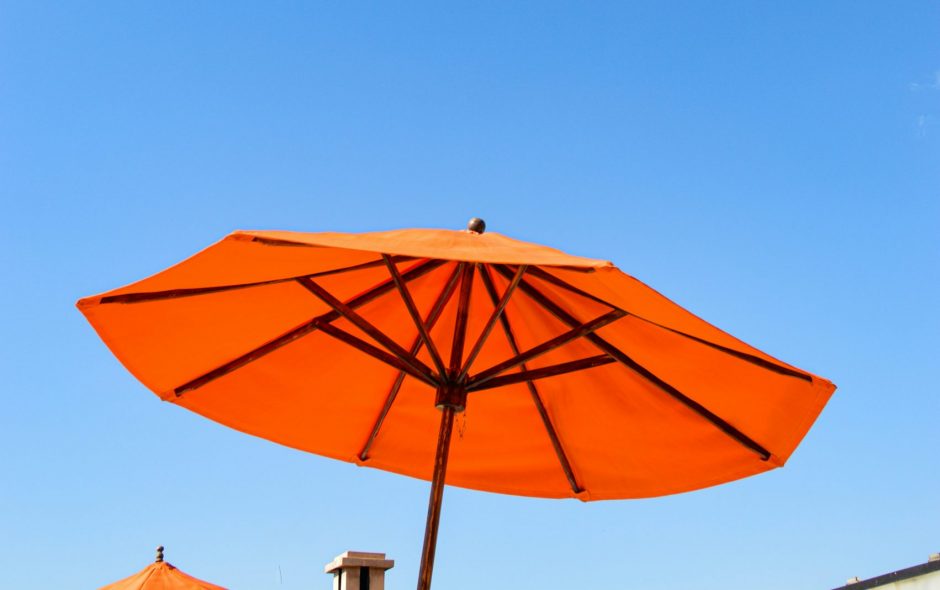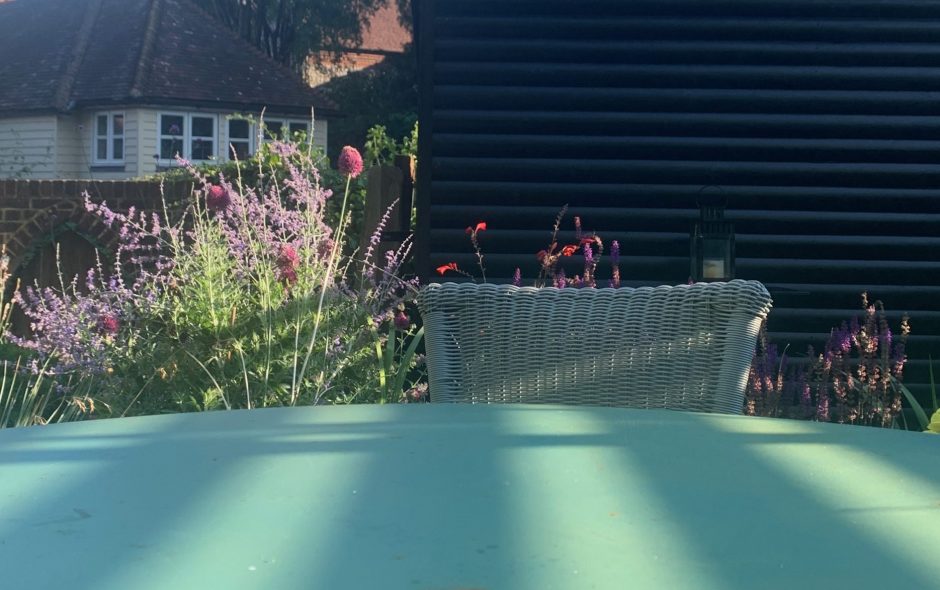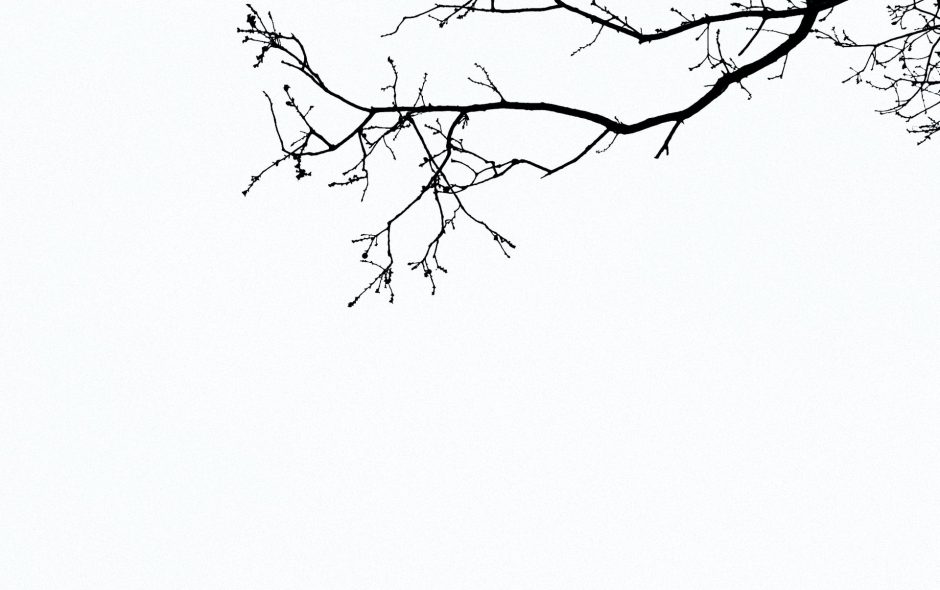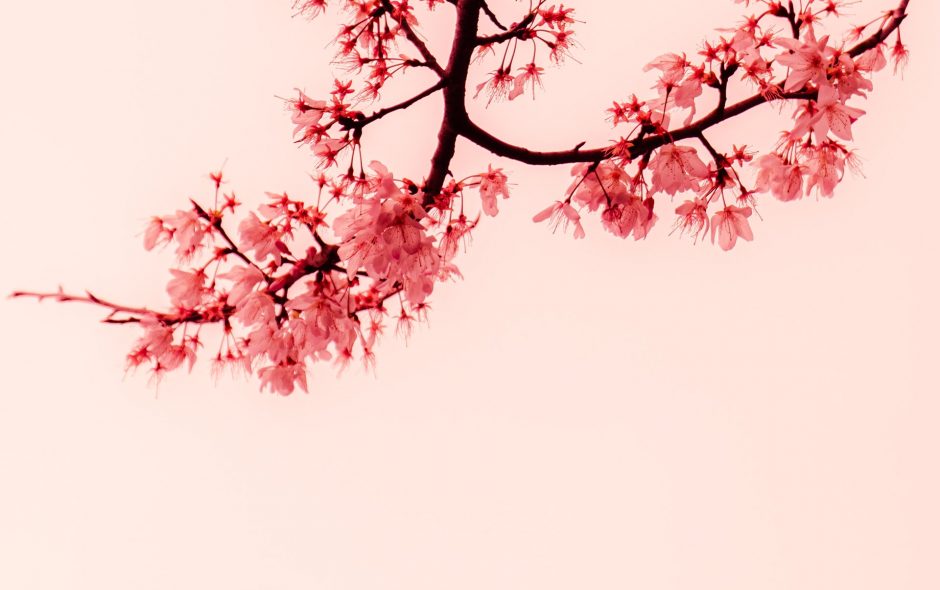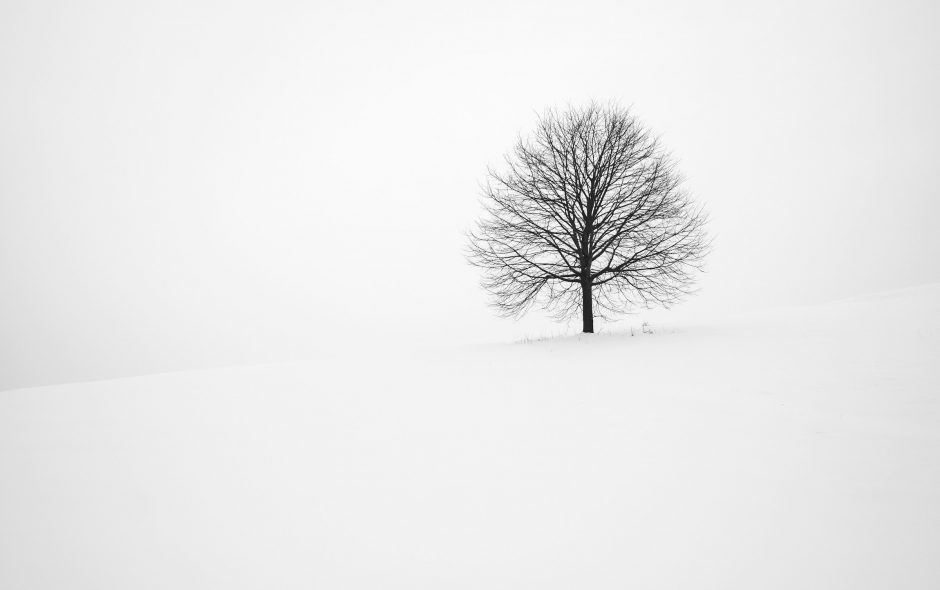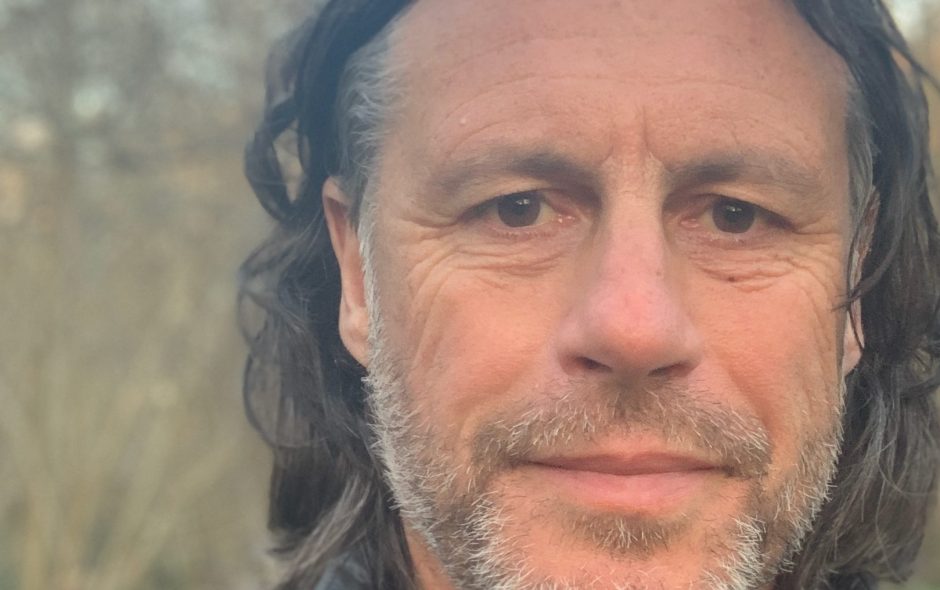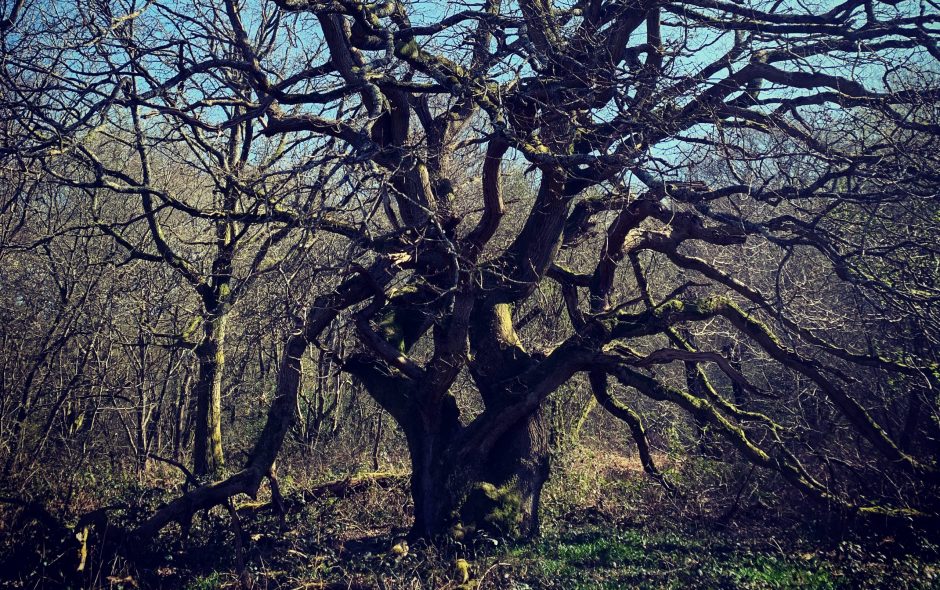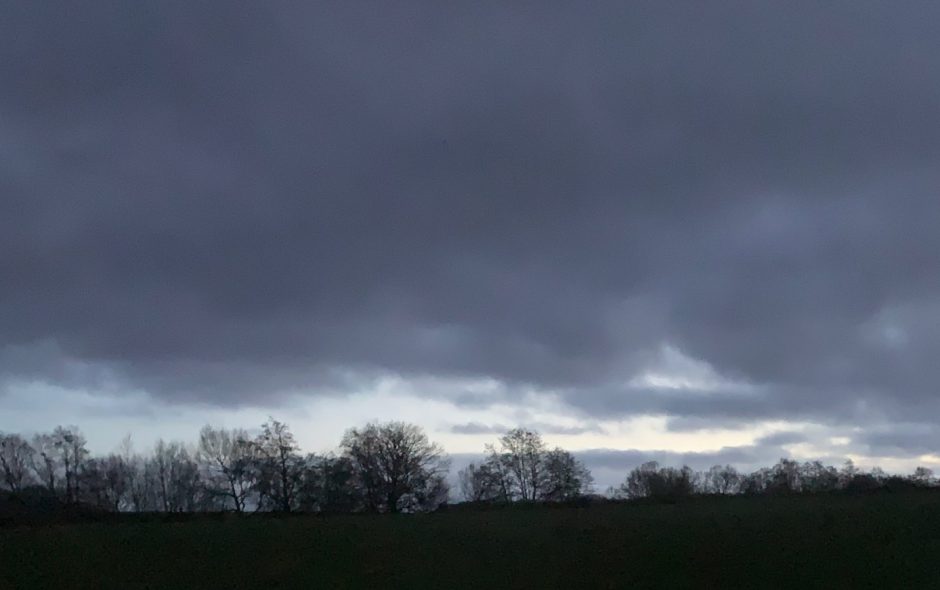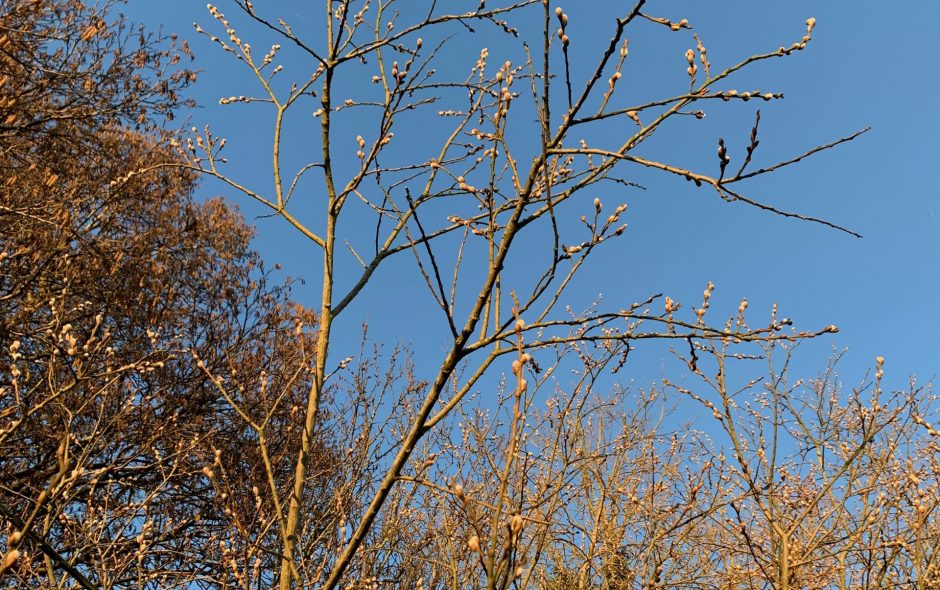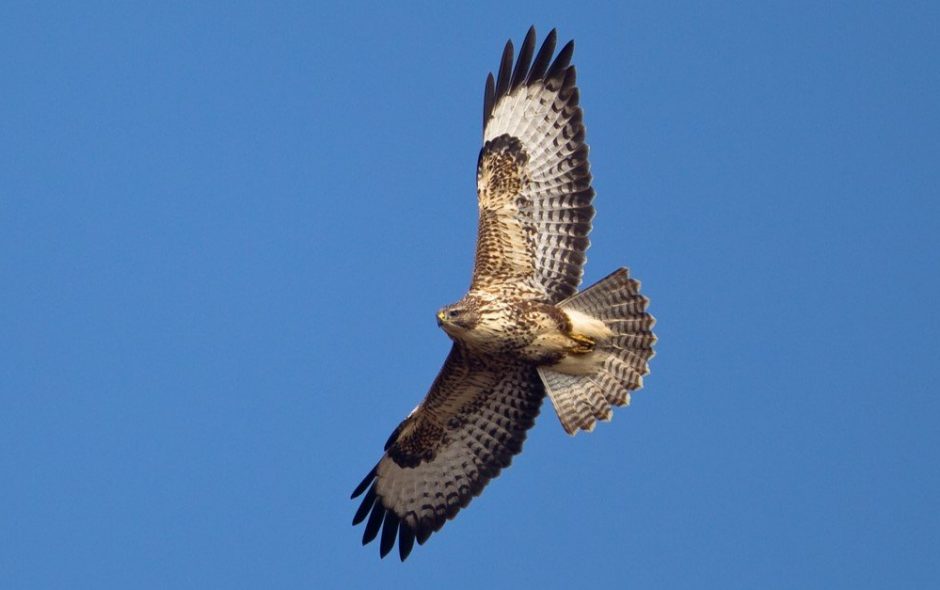In the cinema garden
Under an orange parasol
Drinking a flat white like fine wine.
Coloured pennants flutter in the breeze
A shoal of bright fishes
And pastel flowers flutter too
Yellow, blue and white.
These are not the ancient times
Yet I seek a place of quiet knowing
Like the sages of the distant east.
At the green table
Early morning
Sitting at the green table under a grey-white sky
Hen blackbird startles on the garden wall.
Reading my second-hand book on Kodojin
Japanese literatus out of time
I sense the sky lighten
Time and again –
Glancing up nothing changed.
Twig and Cosmos
When it comes to knowing things
There is receptivity and there is penetration
Or you could call it
Welcoming and projecting.
Looking at the twig structure of the late-flowering cherry tree next door
I settle into an awareness,
An opening.
And become aware that
All the tree comes to me in that small section of twig.
But also that I only know the twig
Through the wholeness of the tree.
And that going wider
The whole earth, the whole cosmos
Shows up in that twig.
And that the twig
In it’s twiggyness
Only makes sense
In the wider presencing of the universe.
It offers the nature of the universe
In its simple twiggyness.
And I look at my right hand
And sense again
That the whole universe is present there.
And the whole universe
Only has its fleshly quality
In the soft being there of my hand.
And that my hand, the twig,
Can only be itself
In my welcoming, receptive gaze
Through its Universing-ness.
The phrase of William Blake
Obviously lurks near
But to go to it
To allow it to come fully to mind
Would flip me from presencing to a projecting thinking
And the softness of the welcoming receptivity would slip away.
To “think” that I know it
Is to put “knowing”
Out of reach.
On Seeing Seeing
First time of writing, of posting, for a long while.
I had the thought of a laptop with just Ulysses on it. A place where I only came to write.
I thought also of the process of writing. How it is like the conscious recording of the journey of a boat setting out onto a lake. One push, two push and jump in. And the wind catches it and carries it. Then writing down the thoughts that rise up from the surface of the experience of the moment. A moment is the stretching out of the expanse that is the single field of my perception and the landscape of what is perceived.
I am conscious of the cherry blossom trees, several of them standing in the gardens marked by the old flint walls between me, my bedroom window and the Barbican. Every day this past week, even the end of the one before, I have been aware of them coming into bloom, but at different times. The one nearest is still in its winter darkness. The one just beyond is now becoming heavy in it’s whitey-pink. The one at the far end of the allotment, beyond my other garden, invisible to me now, is in my memory, somewhere between the other two, a dusting of whiteness, some distance off. It is the 25th of February. This is important. I have gone through my life consistently failing to record when things in nature happen. It doesn’t matter that much but I struggle to be involved in the conversations that go, “things are early this year”, or late, because I never marked what time things have happened in previous years. I have a casual envy for those who do!
Out on the lake, heading over there now, I track back to a thought of some minutes ago, before I started to write.
The trees sensing my house, my weaver’s window, me sitting in my bed. It is not sight, but some sort of knowing. The distant whitey-pink tree knows the dark terracotta tiled house just beyond it. Everything is presencing, one to another. And the presence and the presencing are in the spaces between, with a thick palpable viscosity of sense, not of matter.
What if we do that? If we wrap the field of sensation and perception in the vocabulary of physicality? What stands forth then? What becomes perceptible that is normally unconscious to us?
Let air be my tutor. My guide in learning an awareness, a sensibility, to what is not ordinarily present in my perception.
There is the see-er, and the seen. There is also the seeing. We normally privilege the see-er and the seen, what happens if we privilege the seeing. Firstly, the verb of it, the happening of it. And then the field of it, the dimension, the space, between the seer and the seen. And lastly, the felt sense of it, the palpable presence of the “physicality of seeing”.
And I went to write, “and with all the other senses too”. But I am not qualified to say that. I have not given enough attention to whether it is the same with hearing and touch. And do they actually shift my perception of sight? There is no “space between” with touch. Suddenly I wonder about sensing seeing in the same way as touch. Is there “space between” in the receptivity of soft eyes? What would it be to touch with our sight? And is hearing a specialised form of touch? The movement of the heard against the hearer, through the sway of air?
Photo by Patrick Shaun on Unsplash
Let the winter be
After over a week here, just sometimes, I notice what I wasn’t noticing before. The background. The texture of winter. And what I couldn’t have noticed before. Repetitions. Rhythms.
I am aware of how my endless filters, thinking, expectation, agendas, intentions, previous experiences, cut me off from simply sensing everything around me. Yet my hope is always to escape those things and be tutored by the land alone.
How hard it is proving to “let the winter be”. To be fully aware of the wetness and wet-darkness of everything. Gloomy, dank winter ponds lying everywhere. Rain darkened trees standing in those cold, black pools. Water lying puddled on the paths. And mosses and lichens, fat with rain on the tree trunks, vivid in green and grey. And, everywhere, mud, yellow mud, brown mud, grey mud. Mixed slurry of soil and rock and water. And the water lying beneath the sward that every footstep squelches into. And the deep, brown stream that moves like a huge smooth snake through the woodland beyond the fence behind the hut. And the rushing streams, running clear over stony beds, by the ancient woodland paths.
And the cold. The crisp, clear, singing chill of the winter air. The coldness is the air. And the air lays the coldness on everything. The cold is so clean, so sharp. My skin can see it, glinting like diamonds to the touch.
And it’s in the crunch of the grass. The frost on the branches. The lattice slabs on the frozen lake. The frozen water pump. The air lays her icy breath where she goes.
And the air is the dampness too. And the air lays the dampness on everything.
And the air is the colours. Shrouding everything in grey. Then lightening everything in diamond light, with whitened blue, with strong cobalt and every shade between. And with the darkness of night.
And this is the place of our dwelling. If indeed we dwell. The land is the rocks and the soil giving shape to every living thing. And the air brings life and colour and warmth and cool and movement to every moment of the life of every living thing. And everything has presence, has being, and mirrors everything else in itself, in a dance that is the whole. And this presencing we once called the gods, long before they grew to become abstract beings of the imagination, and maybe now, it is best just to note their coming to us out of the whole.
And we are in this dance too. In no special way. Just animals drawing life from the land and the air, moving and being in the wide place of the land. But also (not more than, just other than) our awareness has taken a path that is different from the others (but with great loss of other powers). And this gifts us in the unique way that everything arises in our experience.
So, maybe, the twist in the web of nature that is called humanness beckons us to do no more than live humbly, in common neighbourliness with the wild community of beings we live amongst. Yet more than this, to bring, as an offering to the whole, the uncommon gift that our quirk of consciousness has bestowed on us.
Not to master but to serve.
Photo by Fabrice Villard on Unsplash
How am I?
We readily ask, “Who am I?”, hoping with this question to make sense of our own identity. But is this actually a misleading question? One that creates for us as many problems as it attempts to solve and creates much pain on the way.
The questions we choose to ask define the path our thinking will take and the sort of things that we are likely to discover.
Maybe there are more useful questions to ask of ourselves than “Who am I?”.
What happens when we ask instead, “What am I?”. What do we discover about ourselves then? What flight of inquiry do we launch out on?
Or maybe, “How am I?”. Not in the sense of, how am I feeling? But rather in “How do I happen?” What processes and patterns are at work to cause me to show up in the world as I do? “How does the event that is me create itself?”.
These two questions, “What” and “How”, take us on a very different path towards getting some useful insights into how we experience our life.
Asking “Who am I?” just takes us down a rabbit hole. “What” and “How” have the potential to take us out into some wild and interesting places.
Image mine
I thought of wisdom
I thought of wisdom. The wisdom held in the land and the language of it. A language not spoken in words but in patterns and relations, movements and gestures. To learn the language of birds is not to find syntax and grammar in the fluctuations of their tone. It is to become aware of happenings and connections in the wider field that prompt their behaviour and the sounds they make. Expanding wider, the language of everything is found in the patterns of movement and relationship of the land, the air, the creatures and the plants. Can we learn this wide, wise, unworded saying?
I thought of thinking. Nature is wise but it does not think. The body is wise but it does not think. Thinking is a niche peculiarity of the recent brain. Everything gets by quite fine without it. The body knows the land and the land knows the body, without thinking. Intelligence comes from thinking, but wisdom and deep knowing are independent of thinking.
I thought of Gregory Bateson quoting Pascal saying, “The heart has reasons that the reason knows not of.” The heart makes sense of things in a way that the thinking mind has no access to. Pascal’s statement needs a little explanation. The heart is the body and everything it does outside of thought. It is feelings, sensations, impressions, intuitions and the like. And ‘the reason’ is the rational thinking part of us.
So there are reasons of the heart, the body and the land. And there is the logic and reasoning and intelligence of the rational mind, useful yes, but not as wise as the reasons of the heart … and of the land.
Image mine
School of Clouds
The air carries her immense and varied feeling. Vast, slow-moving dark clouds move eastwards across the thin blue dusk sky, heavy with rain, but more than that, heavy with the weight of strong emotion bearing down from the sky and through my senses. So different from the rapid moving, almost skittish, game of tag that sometimes air will play in the high tree tops of the beech wood or the cold, clammy, darkness when she roots amongst the rushes, and the alders, black with dampness, at the head of the fishing lake. All are air. What clothes she wears, what variety of moods she carries, in her ever-present, shifting invisibility.
My school of education from the land is forming itself, over the past couple of days. The crows, the ancient trackways, Markstakes Common and its ancient trees, and of course, the air, always the air, have presented themselves most noticeable as my teachers. My responsibility is to apprentice myself to them as completely as I am able.
If I watched the sky for a day, it would always be continually changing, but always slower than my ability to notice. It is always in endless change and is never the same twice. Likewise, the river, likewise the sea, likewise the wind. Life is always in movement, but in a way that is unnameable, that submits ultimately to no laws but its own. Keep in step with the spirit (the ruach, the pneuma, the breath) it goes where it wills. And yet there is order.
There are patterns that form. Waves in the sea, the river, the sand. Gulleys and ravines in mountains, in tree bark, in farm pathways. There is a fingerprint to the Tao.
The left hemisphere is vital to notice the patterns, to learn them. But it really does have two modes to its working. One helpful, when you notice the number of lobes on a leaf, and the markings on a bud. One unhelpful, when it gets lost in story-telling about things – making models and maps and believing them.
To notice you need to move between the right and left attention constantly, but always using the right hemisphere mode as the foundation and point of return.
And slowness. Slowness in attention is everything. And it is my Achilles’ heel.
Image mine
Stirring
How I loved the cold. The ice air freezing. The silence of everything. The absence of visible life. And it was the slow turning of the wheel. But I only really sensed this clearly once it had moved on.
Without first having been with the times of ice, then the filling of the woods with birds and the brightness of the spring air and the growing of the buds, would have been diminished for me. It was the difference that revealed the difference.
As I stood in the presence of the filling Hazel buds last night, the thought arose of the ancient folk conducting their rituals to “cause” the events of nature to occur – to cause the sun to rise, to waken the trees to fruit, and especially, the Mbuti singing to wake up the forest. We are nothing without these events, our lives depend on them. Stock markets, cities, transport systems, internet, will come and go – they are trivial, secondary abstractions – but the movements and change of nature are the very ground of our being. Without them, nothing.
Did the ancient ones really think they were “causing” things to happen “on the outside”? Or was it more that, in enacting their rituals, they entuned their inner landscapes to the events of the land and in that way brought them into being? But, regardless, I sense in me, the echo of the depth of the ancient wonder, the sense of community, and gratitude for the mysterious, yet cyclical, stirrings of the earth. Without them we are nothing, yet we have become completely orphaned from this deep source of our own being. We have become insentient to the place of our own presence here.
Those are just words. As I walked along the field edge last night, I felt the silent stirring of life. And, not to live from this felt awareness of what is happening, in the endless unique moments and places of the land, is to live orphaned and without grounding.
Go back to your land. She will teach you again. But the lesson is not to think ecologically, systemically, conceptually, scientifically; it is to walk in body awareness, earthly resonance and rapport with the land and her more-than-human presences and life-ways.
And only then, peering from that place of presence, to begin cautiously, to think again.
Image mine
Heart flight
High
Above the conifer plantation
With its shadow dark heart
And high above the wide meadow
Where the golden pheasant foraged
Last time I came this way.
High
Hang two buzzards
Riding the gentle air.
I open out my seeing
Till it’s wider than the sky
And the buzzards soar
In the open space
That is me.
I choose one of them.
She flies in the expanse of my wide vision
Then I let this exquisite sensing
Drop into the awareness of my heart.
An unthought knowing
Wide as the endless blue.
Each wing flap
One, two, three, four
Then the strong, still glide
I feel
In the big field of my heart sight.
Each wing beat
And glide
Ripples me
As it ripples the high, wide air.
I tilt and move with the bird.
She flies me.
I close my eyes
To see if I can follow
The bird’s movements
Without sight
But I quickly lose her.
I find her again
Then move off up the road
Still she soars in the expanse of my heart
Till a roadside stream
Distracts me
And she is gone
And I don’t notice the moment of her going.
Image ©James Duncan
